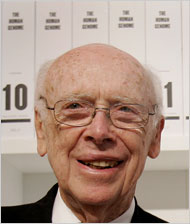 |
Kirsty Wigglesworth/Associated Press |
| James D. Watson in London in June. |
| Want to send this page or a link to a friend? Click on mail at the top of this window. |
| More Science & Technogy |
| James Watson Quits Post After Remarks on Races |
By CORNELIA DEAN |
James D. Watson, the eminent biologist who ignited an uproar last week with remarks about the intelligence of people of African descent, retired yesterday as chancellor of the Cold Spring Harbor Laboratory on Long Island, and from its board.
 |
Kirsty Wigglesworth/Associated Press |
| James D. Watson in London in June. |
In a statement, Dr. Watson noted that, at 79, he was “overdue” to surrender leadership positions at the laboratory, which he joined as director in 1968. He was president from 1994 until 2003. But he said the circumstances of his resignation “are not those which I could ever have anticipated or desired.”
Dr. Watson, who shared a 1962 Nobel Prize for describing the double-helix structure of DNA, and later headed the American government’s part in the international Human Genome Project, is leaving in a swirl of denunciations and canceled speaking invitations, including one from Rockefeller University, which yesterday canceled a lecture he was to have given next week.
Dr. Watson, who has long had a reputation for challenging scientific orthodoxy and for sometimes incendiary off-the-cuff remarks, became a center of controversy last week after he was quoted in The Times of London as suggesting that, over all, people of African descent are not as intelligent as people of European descent.
In the ensuing uproar, he issued a statement apologizing “unreservedly” for the comments, adding, “There is no scientific basis for such a belief.”
But Dr. Watson he did not say he was misquoted, and he could not be reached for comment yesterday.
In a brief interview, Bruce Stillman, the president of the laboratory, insisted that Dr. Watson’s decision to step down was his own. Last week, the board had relieved him of administrative responsibilities as chancellor, a position in which he was concerned mostly with education efforts and fund-raising.
In a statement, the laboratory said Dr. Watson had transformed Cold Spring Harbor from “a small facility into one of the world’s great education and research institutions.” Eduardo Mestre, chairman of the laboratory’s board, said he had made “immeasurable contributions” to the establishment.
But a spokesman for the laboratory said yesterday that while Dr. Watson would keep an office at the laboratory and would live there “in a house he built on land the laboratory owns,” he would no longer have a job there.
Other officials at the laboratory did not respond to telephone calls.
The furor erupted in England, where Dr. Watson was touring to promote his new book, “Avoid Boring People: Lessons from a Life in Science” (Knopf). After his remarks were reported, the Science Museum in London canceled a sold-out speech he was scheduled to deliver and his comments were widely denounced as racist.
The lecture Rockefeller University canceled yesterday was in connection with Dr. Watson’s receipt of this year’s Lewis Thomas Prize, which the university awards annually to scientists whose books help bridge the gap between the laboratory and the wider world. Dr. Watson is being honored for "The Double Helix," the book he wrote about the elucidation of DNA. Though he will still receive the prize, and the $5,000 it carries, "there were some members of the university community who had expressed reservations about Dr. Watson coming here to speak after the controversy over his remarks in the U.K.," Joseph Bonner, Rockefeller’s director of communications, said yesterday.
Mr. Bonner said that just as Rockefeller’s president, Sir Paul M. Nurse, had decided to cancel the event, Dr. Watson called to suggest the same thing. Mr. Bonner said Sir Paul made the decision after consulting “various members of the university community and university leadership.”
In his statement, Dr. Watson said the work of the Human Genome Project, an international effort that deciphered the chemical contents of human genes, had opened the door to work on many diseases, particularly illnesses like schizophrenia and bipolar disorder, ailments that he said had afflicted members of his family.
But he was also aware of how the knowledge of genetics could be used for malign purposes. One of his first acts as director of the Human Genome Project was to set aside 3 percent of its money for studies of the work’s legal and ethical implications. The figure was later raised to 5 percent.
In his statement Dr. Watson referred to his Scots and Irish forebears, saying their lives had been guided by faith in reason and social justice, “especially the need for those on top to help care for the less fortunate.”
Copyright 2007 The New York Times Company. Reprinted from The New York Times, Science, of Friday, October 26, 2007.
| Wehaitians.com, the scholarly journal of democracy and human rights |
| More from wehaitians.com |